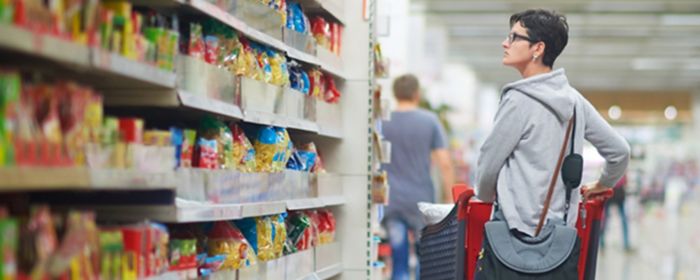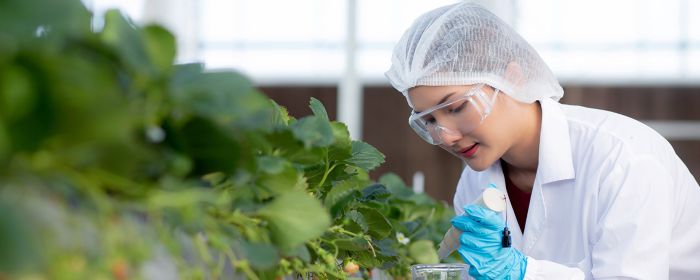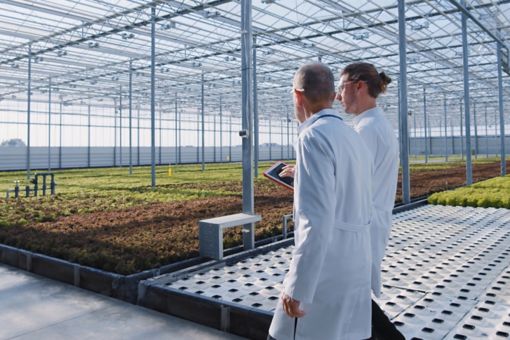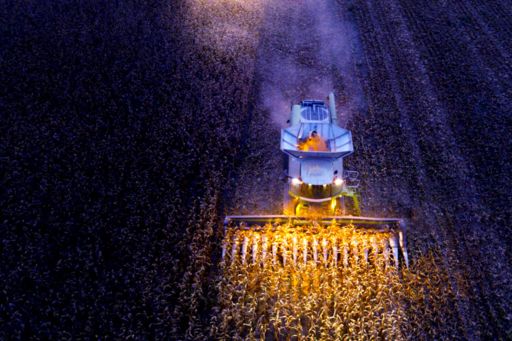Canada has a safe and secure food system, which has resulted in a high level of trust among consumers. In part, that’s because of standards that make it harder to get food products approved in Canada in comparison to many other jurisdictions. While Canada has set the bar high, changing consumer behaviours and values are driving the need for increased transparency and trust in the food system—and technology has a key role to play.
The current state of Canada’s food system
According to a 2021 benchmarking report, Canadian agriculture has one of the lowest environmental footprints in the world, with a strong track record of agronomic, food safety and animal welfare practices.1 The Canadian Centre for Food Integrity (CCFI) found that most Canadians trust farmers and believe the country’s food safety protocols are more stringent than other countries.2 While an underlying level of trust exists, consumers today want even more information about their food.
43% of consumers prefer to buy from brands that align with their values
55% of consumers say they are concerened about the environmental impact of their food purchases
According to the 2022 Hunger Signs Report by KPMG US, values and lifestyles are being factored into purchasing decisions. Consumers want to know where their food is coming from, how it’s being produced and how it ties into their values, such as climate change impact. Indeed, 43 per cent of consumers surveyed prefer to buy from brands that align with their values, while 55 per cent say they’re concerned about the environmental impact of their food purchases.
This, in turn, is driving the need for increased transparency in the food system. Canadians are overwhelmed with too much information, according to a 2021 CCFI report.3 Respondents didn’t feel they could confidently say whether the food system is moving in the right direction because they don’t know what information to trust.
Despite the availability of credible sources, there’s the potential for conflicting or misleading information. A farm might claim to produce organic products yet doesn’t treat its animals humanely. So, while the packaging claims the product is organic, it doesn’t mean the company is necessarily trustworthy.
The consumer’s role in driving transparency and trust
In Canada and globally, there’s an increased desire by consumers to cut through misinformation and understand if the food products they’re buying meet certain standards. Many Canadians are seeking to empower themselves by taking more control over their food choices, this includes reading labels, shopping at farmers’ markets and purchasing fresh local produce in season.
Consumers are also actively choosing brands that are genuinely committed to reducing their environmental impact on the planet. KPMG International’s Me, my life, my wallet report found that nearly two-thirds of global consumers are willing to pay more for sustainability in their supermarkets and convenience stores, and are increasingly demanding environmentally friendly alternatives—if they can afford it.
There’s also concern about food fraud—the intentional substitution, adulteration or mis-labelling of food, food ingredients or food packaging for economic gain. While 59 per cent of Canadians are concerned about the safety of imported foods, quantifying the economic and public health impact of food fraud remains difficult, mainly because of a lack of reliable information.4 Canada is still lagging market leaders when it comes to deeper transparency in the food system.
The EU, for example, is embarking on green deal diplomacy to advance its principles abroad and embed this thinking into trade agreements; certification is required to gain market access for certain products. New Zealand has been developing a Sustainability Dashboard to track its food performance and verify “clean-green” assertions. Ireland has pioneered the world’s first national food and drink sustainability program with measurable sustainability targets across all its supply chains.
Blockchain and IoT: The building blocks of building trust
If food companies make claims, they need to back them up—and that’s where data can help. Blockchains can store data and enable quick tracking across supply chain processes to validate geographic origin, methods of production and biological and/or chemical identity. This lends itself to food safety applications such as tracking contaminated romaine lettuce.
While you can track and trace food—such as whether a piece of halibut is line-caught from a sustainable part of the ocean—blockchains can also be used to track Scope 1, 2 and 3 emissions. Many manufacturers have significant Scope 3 emissions, which are produced by third parties in their supply chain. Tracking those emissions is important in helping to reduce the company’s overall carbon footprint and ensuring its sustainability claims are accurate.
Combining blockchain with the Internet of Things (IoT) offers a powerful framework to revolutionize the food industry. Using sensors in food production, transportation and distribution can produce a constant stream of up-to-date data for analysis, which can be further leveraged through automation and machine learning.
The challenge lies in interpreting and leveraging this data. While there’s a cost to implementing new technologies, there’s also the potential for creating efficiencies in your operations and supply chains. This can result in long-term cost savings while fostering transparency, trust and loyalty in a company’s brand and products. KPMG can help analyze and interpret data with our Origins platform, a unique blockchain track-and-trace solution designed for businesses that depend on highly connected, integrated supply chains.
The adoption of advanced technologies and innovative processes can help agribusiness companies meet their traceability and sustainability goals. But consumer behaviour and traceability is only one aspect influencing the future of food. There are several other risks and challenges—such as the skyrocketing cost of food—that producers and processors need to consider.
1 Benchmarking Canada’s Agri-Food Sustainability Leadership | A Roadmap, Chicken Farmers of Canada, January 2021
2 Public Trust Research 2021, The Canadian Centre for Food Integrity, 2021
3 Public Trust Research 2021, The Canadian Centre for Food Integrity, 2021
4 Food Fraud in Canada: Understanding the Risks and Exploring Opportunities for Leadership, Arrell Food Institute, University of Guelph, May 2021
Explore the series
Insights and resources
Connect with us
Stay up to date with what matters to you
Gain access to personalized content based on your interests by signing up today
Connect with us
- Find office locations kpmg.findOfficeLocations
- kpmg.emailUs
- Social media @ KPMG kpmg.socialMedia







